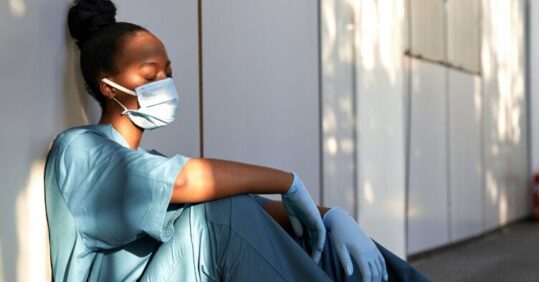Covid sick pay withdrawal an ‘insult to our sacrifices’, say nurses

The Government’s decision to withdraw special leave and sick pay for Covid related absences is not only insulting to the sacrifices of healthcare workers, put is putting both their safety and the safety of patients at risk, nurses have said.
In Wales, staff off for Covid-related absences will move to half pay after a year off from 1 July, while Covid sick pay will end on 31 August in Scotland. However, Covid sick pay remains in Northern Ireland for now.
The withdrawal of Covid sick pay was heavily criticised by nurses, with the RCN to branding the decision ‘neglectful’ and ‘unfair’. Now, around a month since Covid sick pay was withdrawn in England and Scotland, nurses are calling for its immediate return.
Maria Esslinger-Raven is a midwife with the NHS who suffers from Long Covid. Last month, she started a petition calling for the government to reintroduce Covid sick pay for NHS professionals, which has reached over 37,000 signatures.
‘Long Covid has taken all that I am,’ she told Nursing in Practice. ‘This is not the young woman I used to know, it’s a shell of her. At the age of 25, I have a blue badge, a year ago if you had told me what my life would be. I wouldn’t have believed it. I could take on the world, now I can’t even take on the washing up.’
Related Article: New preceptorship package for social care nurses
The ONS currently estimates that 1.6 million people in the UK have suffered from long Covid symptoms, with 20% finding that the condition has a significant impact on their daily lives.
There is also mounting evidence that healthcare workers are more at risk of long Covid. The risk of developing long Covid also increases with each infection, meaning that nurses, who have the highest rate of Covid infections, are especially at risk of developing serious long Covid.
‘NHS staff have put their safety at risk working with covid positive patients during the pandemic,’ said Ms Esslinger-Raven. ‘Healthcare professionals continue to work long hours with suboptimal staffing; putting their health and safety at risk.
‘Removing pay and sickness leave protection not only is an abomination and an insult to their sacrifices but it could cause for patient and workforce safety to reduce for several reasons.’
Ms Esslinger-Raven points out that the withdrawal of Covid sick pay creates a pressure for staff to return to work faster, increasing the risk of multiple infections and exposure to increased stress which can cause long Covid symptoms to relapse or worsen.
‘I know healthcare professionals not ready to return to work, that are not fit, are considering returning to work as they are scared about being able to afford their mortgage, bills, food, and children’s clothes,’ she said.
Ms Esslinger-Raven hopes that her petition will get the attention of the Government and bring about the reinstatement of sick pay to help staff recover before they return to work and improve staff retention among what NHS leaders have called a staffing ‘crisis’.
One major issue that nurses with long Covid face is a lack of sufficient understanding of their condition. The underlying causes of long Covid are poorly understood and the list of symptoms is long and extremely varied; just this month, hair loss and erectile disfunction were added to the list of potential symptoms.
Dr Alison Twycross, Long Covid Nurses and Midwives UK (LCNMUK) chair, said: ‘Despite a list of the investigations required for people with long Covid having been available for over a year, most of us have not had these tests and still have no explanation for our long Covid symptoms
Related Article: Applications to study nursing in England at ‘new low’
‘I wouldn’t want a member of staff returning to a mentally and physically demanding job without knowing what was causing their symptoms. Current NHS waiting lists are at a record high.
‘The changes to NHS Covid sick pay make it likely that staff will have run out of statutory sick pay well before they are able to access these tests and treatment.’
Dr Twycross has also raised concerns in a letter writing campaign to MPs and elected representatives, which argues that NHS staff suffering from long Covid are exposed to serious ableist discrimination.
Although ‘ableism in the NHS is not new and was around before long Covid became an issue’, Dr Twycross said that ‘evidence from the Long Covid Facebook groups suggests the situation has got worse with Long Covid. There appears no room for flexibility.
‘NHS staff with Long Covid constantly have their experiences downplayed and minimised. They are told off by their managers for not keeping up with their colleagues and perceived by their colleagues for not pulling their weight.’
It is for these reasons that LCNMUK are calling for the Government to ‘immediately restore Covid sick pay protection to avoid pushing more nurses and other NHS staff into destitution.’
Related Article: Paul Rees appointed as permanent NMC chief executive and registrar
A Department of Health and Social Care spokesperson said: “We hugely value and appreciate the dedication and contribution of all NHS staff who have worked tirelessly throughout the pandemic.
“At the start of the pandemic when we knew little about the virus, we introduced temporary non-contractual sickness guidance to help employers stop the spread of the virus. We have since published the Living With Covid plan which sets out how we are managing the virus, and this temporary guidance has been withdrawn.
“Staff will return to the normal contractual terms and conditions sickness arrangements for NHS staff, meaning depending on length of service, they are entitled to full sick pay for up to six months, and up to a further six months of half pay.”

See how our symptom tool can help you make better sense of patient presentations
Click here to search a symptom




